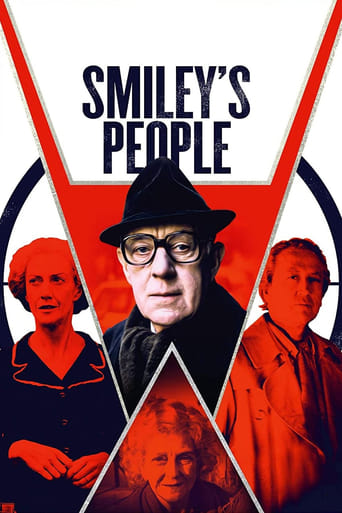TheLittleSongbird
Tinker, Tailor, Soldier, Spy is still to this day one of the best mini-series I've seen. Hearing nothing but good things about Smiley's People I was strongly anticipating it. And I found it every bit as good. It is visually beautiful while staying true to the period, and the atmosphere that is evoked is both tense and melancholic. Smiley's People's music is haunting and doesn't fall into the trap of being too low-key or overbearing, the story is just as complex with a strong (poignant) moral ambiguity and the writing is very clever and intelligent. The camera work is stylishly done too, a number of times I would never have thought it was made for TV, likewise with the direction. With a series of this length, I was impressed by how much effort was made into making the audience care about the characters and how great the acting was. I love Eileen Atkins and she was in my view excellent. Alec Guiness is mesmerising in one of his best and most iconic roles. All in all, I loved it, it was every bit as good as Tinker, Tailor... and considering how justifiably magnificent that is, that's quite a feat. 10/10 Bethany Cox
knucklebreather
"Smiley's People" is the sequel miniseries to "Tinker, Tailor, Soldier, Spy" and follows George Smiley as he faces off against his nemesis, the fanatical soviet spymaster Karla.At the onset, Smiley is, as usual, in forced retirement but brought back in to help out his colleagues at "The Circus" (British Intelligence). Smiley is sent to make sure no scandal erupts from the murder of a nearly-forgotten former informant of the Circus, a Soviet defector known as The General. Smiley realizes the General did not die in a senile mishap, as the Circus's new order assumes, but instead had very important information.The series is a bit tidier in format than its predecessor, and perhaps easier to understand, with Smiley spending the first half figuring out what the General's information was, and the second half exploiting the damaging information for maximum damage to the Soviets. There's even more spy thriller action in this series, which isn't saying much, but it's still noticeable (of course, the appeal of the Smiley stories is how exciting they are without any hokey James Bond kind of silliness).This series also gives Smiley more psychological depth, and we see him resolve his glaring character defect - his tolerance of his wife's infidelity - while in the process gaining a new one - a level of cold ruthlessness which he might have described as fanaticism in his opponent Karla.Unfortunately, it doesn't seem that having more components made this a better production than its predecessor. There wasn't quite the delicious suspense building, for one thing, with each episode of the first series ending in a memorable but maturely done cliffhanger. I also think the first series benefited from Guillam as a constant sidekick to Smiley in every episode, whereas in this series he is somewhat of a caricature and played by a different actor who I found took Guillam's glibness much too far. There's also the distracting side-story of Madame Ostrakova and what seems to have been a cheaper production quality, with occasional overlong filler shots of cars driving or the camera looking out a window of a car.I think all of these combined made for a less interesting series that just didn't grab you the way the first one did. Still, this is a must-watch if you liked the first one. It's not bad, it's jut not as good as its predecessor.
elisedfr
When General Vladimir, a former MI6 agent, is murdered, no one thinks of warning an old Russian lady settled in Paris. No one knows he was Mme Ostrakova's only hope to understand the weird and perhaps dangerous situation she is into, after Russian authorities approached her to permit her estranged daughter to join her in France, and that she has still never seen the sight of her. On the other hand, George Smiley, the middle aged spy master, is once again put out of retirement to investigate about this mysterious case. Or rather, from Whitehall's imperious order, to bury it. And the more he looks into it, the more he's convinced this would be a very bad idea...Smiley's People happens a few years later TTSS: actually the third part of a novel trilogy by John Le Carré, whose second part, was never filmed. George Smiley is not the Circus chief anymore and has come back to semi-retirement and complicated marriage with Ann. His successor, Saul Enderby, is "an Atlantic man", a bureaucrat just as scrupulous than Percy Allelline, but a bit more clever. And Smiley is quite reluctant with working for the Circus again, until he learns it could lead to the fall of his old nemesis Karla : the elusive, cause-committed, high officer of Moscow Center. In some aspects, this miniseries is very similar to the previous : from the almost identical casting to the same idea of Smiley investigating through reminiscences of the past and crucial encounters. And yet, the rhythm as well as the mood, leave the impression of a change. While a part of TTSS's charm and almost flawless tempo was in a highly structured a plot, SP drifts, slows down then gets quicker, taking Smiley from London to Hamburg, Paris, Berne and finally Berlin. Because of this, the spy's quest looks more hazardous , almost blurring. The tone is also different, both cruddier and sadder. A feeling of danger wraps all the episodes and sheer violence explodes once in a while, often in the most powerful moments : in the screams of panic of Tatiana, a young schizophrenic girl, in the brutally erotic dance of a Hamburg brothel, and most of all in the discovery of a butchered body on a boat while ashore, some guys are trying to break Smiley's car. And the general atmosphere is one of nostalgia and failure (though humor is still present): this is the post- Haydon era, after the mole has been found out to be the most charismatic person of the Circus. The shadow of his treachery is still very alive for the characters, who have lost those last hopes they possessed in TTSS. George Smiley, among all, has felt the blow. Turning from a compassionate spy to a wandering, self-doubted soul, who will go for every method to get Karla, and still asks himself if it's worth it. Alec Guiness did a magnificent job in pursuing his portray of Smiley, suggesting disgust and disillusion behind his calm facade. Supporting characters have grown weary as well: Connie Sachs, (Beryl Reid), is almost dying and she works harder than ever to give her precious memories to Smiley, Peter Guillam (Michael Byrne, the only important cast change who's fine but not as much as Jayston in TTSS) still likes fast cars but seems to have said his youth goodbye, Karla ( Patrick Stewart) appears as a frail little old man, who makes dangerous choices out of concern for his daughter; Ann Smiley (Sîan Phillips) must face definite separation. Even Cabinet Secretary Oliver Lacon (Anthony Bate) is going through a depression after his wife has left him. Only Toby Esterhase (refreshingly funny Bernard Hepton) who has gone back to his Hungarian origins and his profession of selling forgeries, seems to enjoy himself now- yet, it's Esterhase who says to Smiley: " We're over. They don't want us anymore".New characters fit well this feeling of discouragement. The young ones are outshone by their heroic oldsters:they try to escape from them and fail like Villem; or to reach their level and fail, like Mostyn. Old timers such as Vladimir (Cürd Jurgens) and Otto Leipzig (Vladek Sheybal) who want to go back on the battlefield are not trusted and treated as mild eccentrics by the Circus. Enderby appears as an ambiguous new chief of MI6 : his smarmy attitude and cynical jokes indicate a mocking despise for both his colleagues and adversaries; and yet he seems almost fascinated by the obstinate fight Smiley wages, so different from his own. He's played well, if a bit over the top by Barry Foster. There is also a little Russian bureaucrat (Michael Lonsdale), an ordinary man with human faults, who gets stuck in a secret plan he understands better than he's thought of. As for Tatiana " the daughter of a man too important to exist" (Tusse Silberg) , she's probably the most moving figure of the story-An innocent girl who sees too clearly the shadows of her traumatizing past.Pehaps a shade less limpid than its prequel, this mini -serie still gets a fine direction by Simon Langton, a compelling script, a lot of fascinating scenes which makes it truly unforgettable. The reunion between George Smiley and Toby, his oldest protegé, with friendship coming over mistrust; Grigoriev's interrogation, from light humor to drama; Smiley meeting Tatiana at the Swiss clinic: "Are you God?" asks the girl, "No, I'm just an ordinary person" answers Smiley; and the final, empty exchange of looks of the spy and Karla near the Berlin frontier. Oddly enough, my favorite moment is when Smiley is unable to enter in a boat which is far away from the pier and shouts for help. James Bond would have taken a submarine out of his pocket. That's the kind of things that makes Smiley close to us. Imperfect, sure he was, like all his people- spies, clerks, crooks, politicians, victims, double-agents... But he really was human.
whist
While still a watchable and intelligent story, Smiley's People is a distinctly different animal from its companion Tinker Tailor. Each time I've watched Smiley's People I've found myself yearning for the kinds of complexities and subtleties movies based on LeCarre''s other stories are usually rich with - alas, the yearning goes unrequited. Whereas I can watch Tinker Tailor yet again and discover an uncaught double entendre or an unnoticed directorial adumbration, I find little new after repeated viewings of Smiley's People. What makes Smiley's People so disappointing? First, the complexity of supporting characters in SP is woeful. Sometimes there are explicit claims that this or that person is a bit checkered, other times there is a hint that a person is running under false colors, but in every case what we are presented with are affable, earnest, innocuous people, and any potentially complicating factors are forgotten.Another disappointment is the generally threadbare plot. I haven't read the book so I have no idea if there is more to it than is captured in the movie, but the story strikes me as pretty under-inflated for its momentous outcome. Perhaps, in addition to an intricate plot, it is the play of dark and light across the landscape that fascinates us. But this kind of interference pattern is largely lacking in Smiley's People. Perhaps most disappointing is that Smiley's People is really not a spy movie at all. Sadly, George Smiley has been reduced to little more than another bbc shire detective. One intriguing characteristic of the spy genre is that of the minions, which each side keeps, and the perverse way these underlings are manipulated by their controllers who are always ready to gambit. In The Spy Who Came in from the Cold, for example, the spy Leamus is passed up the chain of eastern bloc dog's bodys, and each in turn is treated with contempt by his better. In Smiley's People, rather ironically, it is not his people, but Smiley who does most of the trotting around searching for clues.There is one scene, late in the movie, that reminds me of the 'old' circus and its culture. When we meet Saul Enderby and are treated to his brand of pompous asininity - a sure sign of some serious deception - I finally feel a waking interest. But alas it is too little and too late.




